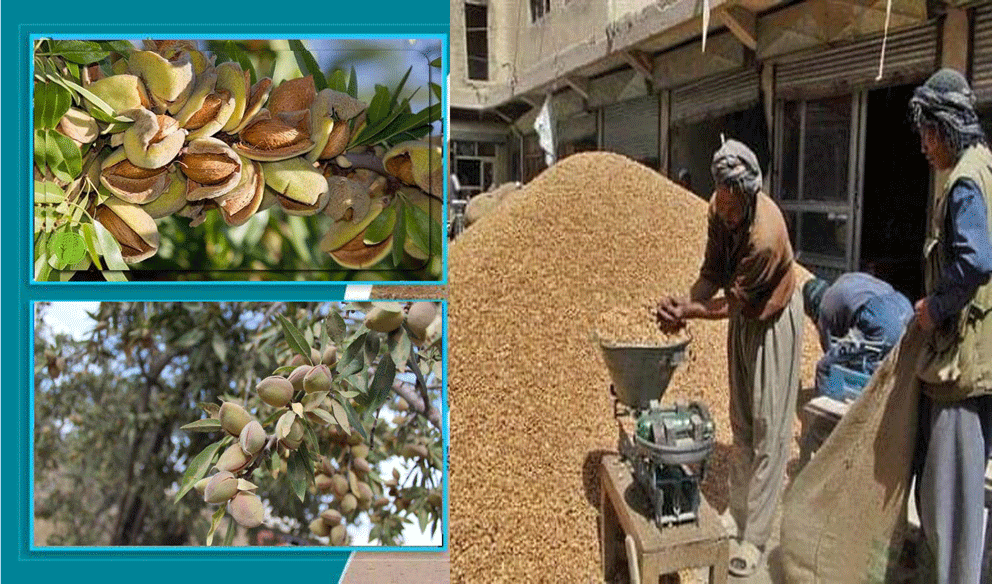NEILI (Pajhwok): Officials in northern Daikundi province say that farmers in the province have supplied over 25,000 metric tons of almonds to the market this year, reflecting an increase of about 18 percent from last year’s harvest.
Sayed Sultan Mousavi, promotion manager at the Agriculture, Irrigation, and Livestock department of Daikundi, told Pajhwok Afghan News that due to increased rainfall and water availability, farmers produced more than 25,000 metric tons of almonds this year, while last year approximately 20,765 metric tons were harvested.
He recalled in previous years, almond yields in the province had decreased due to drought and natural disasters.
Almonds are the only highly profitable crop, and according to officials, most people in Daikundi depend on almonds for their livelihoods.
Repeated droughts in the country, particularly in Daikundi, have severely affected farmers, who report that a large number of trees have dried up over the past few years due to water shortages.
Amir Mohammad, one of the farmers in Daikundi, told Pajhwok that almonds were a significant source of income for them, and their lives depended on this crop.
He stated, “Around six or seven years ago, our almond yield was very high, and almost every household sold over 700 kilograms of almonds. However, since then, our trees have either dried up or been affected by pests.”
He also mentioned that due to drought and natural disasters, almond yields had nearly vanished in recent years, but this year’s consistent rainfall has led to a slight increase in production.
Noor Mohammad, another farmer, said, “Drought has had a significant impact on fruit orchards, particularly apple, apricot, and almond trees. The canals and rivers lacked water.” However, he is now hopeful of obtaining a larger harvest from his almond trees.
He added, “I am happy that due to rains; this year almond yields are slightly higher than last year.”
Mohammad emphasized that the government should provide a suitable market for selling their products, especially almonds.
He stated, “Facilities for processing almonds should be established; the roads in Daikundi are in very poor condition, which increases transportation costs. Our request to the government is to repair the roads.”
These farmers urge the government and aid organizations to assist them and compensate damages caused by drought.
They noted that almonds from Daikundi are transported to Kabul, Ghazni, and other provinces through long and difficult routes for sale.
Haji Khodabakhsh, an almond trader in Daikundi, told Pajhwok the province lacked processing facilities for almonds and when they purchase almonds from farmers, they directly transport it to Kabul or Ghazni.
He added that this incurs heavy costs, forcing traders to buy almonds at lower prices from farmers.
He called on the government to provide facilities for almond processing in Daikundi.
Officials and farmers in Daikundi say that there are about 21 types of almonds in the province, with Sarbay, Kandzi, Kafmal, Sangak and Rasa almonds being the most well-known. The prices of Rasa and Sarbay almonds are several times higher than other varieties.
The highest yields of almonds come from Neili, the provincial capital, and Miramur and Shahristan districts.
Meanwhile, the promotion manager of the Agriculture, Irrigation, and Livestock of Daikundi said his department in collaboration with non-governmental organizations had provided necessary assistance to farmers and gardeners this year.
He added, “Distribution of saplings and improved quality seeds, chemical fertilizers, quality pesticides, and workshops for farmers have been part of the agriculture directorate’s programs this year in collaboration with organizations.”
Moreover, women play a significant role alongside men in almond harvesting in Daikundi.
Jamila, a businesswoman from Daikundi, told Pajhwok that women are mostly active in the collection and cultivation of almond products. She stated, “Women in Daikundi work alongside men in all tasks, but since almond harvesting is not too difficult, men often assign this work to women.”
She added that women in Daikundi constantly work hard to cover family expenses and put in their best efforts.
She urged the government not to overlook women’s contributions in this area and to have supportive programs for them.
This comes at a time when more than 90 percent of the people in Daikundi are engaged in agriculture, and a significant portion of their income comes from almond production.
sa/ma







GET IN TOUCH
NEWSLETTER
SUGGEST A STORY
PAJHWOK MOBILE APP